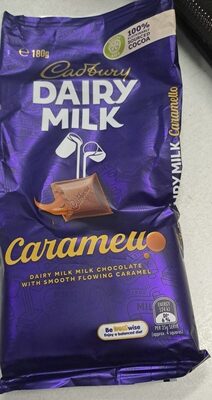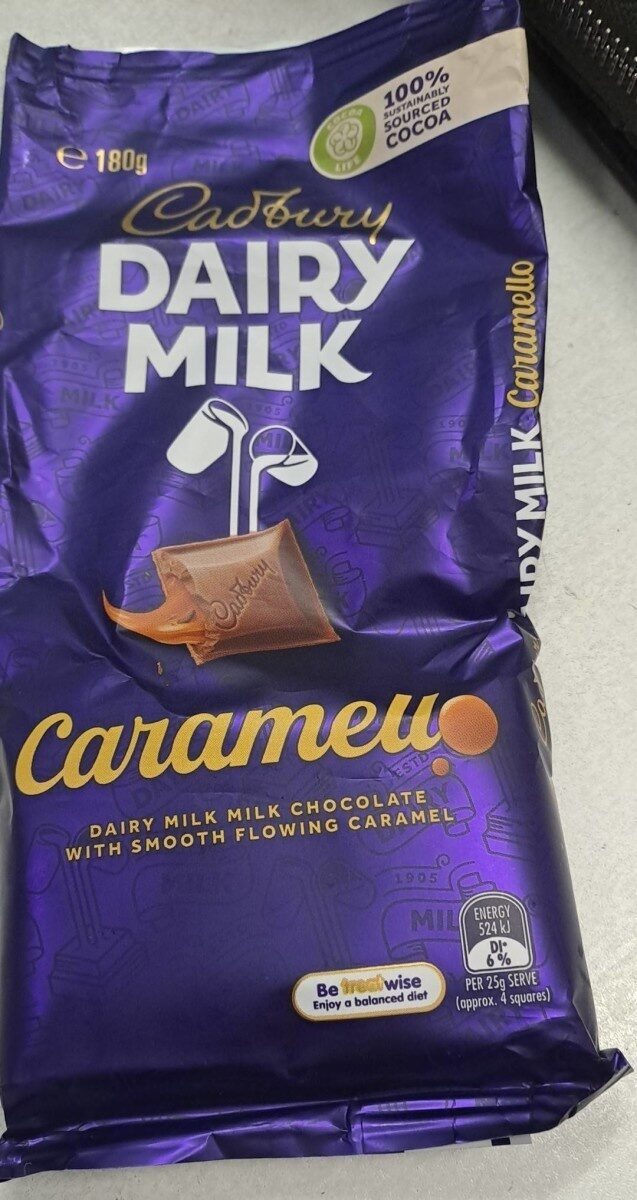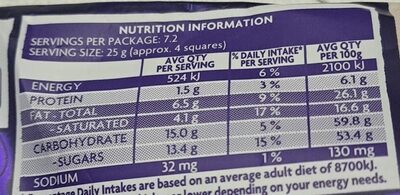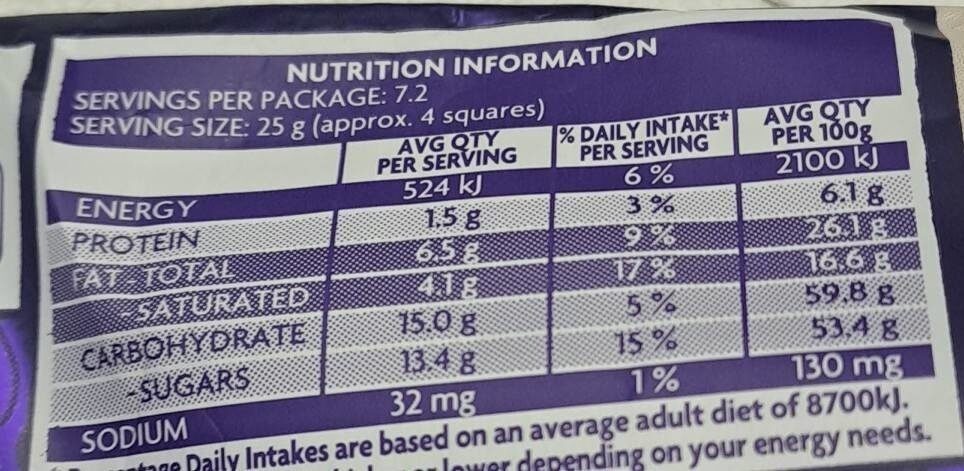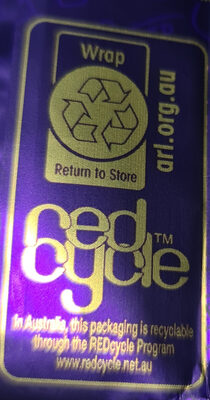Help us make food transparency the norm!
As a non-profit organization, we depend on your donations to continue informing consumers around the world about what they eat.
The food revolution starts with you!
Dairy Milk Caramello - Cadbury - 180g
Dairy Milk Caramello - Cadbury - 180g
This product page is not complete. You can help to complete it by editing it and adding more data from the photos we have, or by taking more photos using the app for Android or iPhone/iPad. Thank you!
×
Barcode: 9300617064978 (EAN / EAN-13)
Quantity: 180g
Packaging: Plastic
Brands: Cadbury
Categories: Snacks, Sweet snacks, Cocoa and its products, Confectioneries, Chocolates, Milk chocolates, Caramel chocolates, Milk chocolate with caramel
Labels, certifications, awards:
Cocoa Life
Origin of ingredients: Australia
Manufacturing or processing places: Tasmania
Link to the product page on the official site of the producer: http://cadbury.com.au
Stores: Woolworths, Coles
Countries where sold: Australia, New Caledonia, New Zealand
Matching with your preferences
Health
Ingredients
-
19 ingredients
FULL CREAM MILK, SUGAR, COCOA BUTTER, GLUCOSE SYRUP, MILK SOLIDS, COCOA MASS, SWEETENED CONDENSED MILK ?(MILK, SUGAR), GOLDEN SYRUP, INVERT SUGAR, VEGETABLE FAT, EMULSIFIERS (SOY LECITHIN, 476), SALT, ACIDITY REGULATOR (331). FLAVOURSAllergens: Milk, SoybeansTraces: Gluten, Nuts, Peanuts
Food processing
-
Ultra processed foods
Elements that indicate the product is in the 4 - Ultra processed food and drink products group:
- Additive: E322 - Lecithins
- Additive: E476 - Polyglycerol polyricinoleate
- Ingredient: Emulsifier
- Ingredient: Flavouring
- Ingredient: Glucose
- Ingredient: Glucose syrup
- Ingredient: Invert sugar
Food products are classified into 4 groups according to their degree of processing:
- Unprocessed or minimally processed foods
- Processed culinary ingredients
- Processed foods
- Ultra processed foods
The determination of the group is based on the category of the product and on the ingredients it contains.
Additives
-
E322 - Lecithins
Lecithins are natural compounds commonly used in the food industry as emulsifiers and stabilizers.
Extracted from sources like soybeans and eggs, lecithins consist of phospholipids that enhance the mixing of oil and water, ensuring smooth textures in various products like chocolates, dressings, and baked goods.
They do not present any known health risks.
-
E322i - Lecithin
Lecithins are natural compounds commonly used in the food industry as emulsifiers and stabilizers.
Extracted from sources like soybeans and eggs, lecithins consist of phospholipids that enhance the mixing of oil and water, ensuring smooth textures in various products like chocolates, dressings, and baked goods.
They do not present any known health risks.
-
E331 - Sodium citrates
Sodium citrate: Sodium citrate may refer to any of the sodium salts of citrate -though most commonly the third-: Monosodium citrate Disodium citrate Trisodium citrateThe three forms of the salt are collectively known by the E number E331. Sodium citrates are used as acidity regulators in food and drinks, and also as emulsifiers for oils. They enable cheeses to melt without becoming greasy.Source: Wikipedia
-
E476 - Polyglycerol polyricinoleate
Polyglycerol polyricinoleate: Polyglycerol polyricinoleate -PGPR-, E476, is an emulsifier made from glycerol and fatty acids -usually from castor bean, but also from soybean oil-. In chocolate, compound chocolate and similar coatings, PGPR is mainly used with another substance like lecithin to reduce viscosity. It is used at low levels -below 0.5%-, and works by decreasing the friction between the solid particles -e.g. cacao, sugar, milk- in molten chocolate, reducing the yield stress so that it flows more easily, approaching the behaviour of a Newtonian fluid. It can also be used as an emulsifier in spreads and in salad dressings, or to improve the texture of baked goods. It is made up of a short chain of glycerol molecules connected by ether bonds, with ricinoleic acid side chains connected by ester bonds. PGPR is a yellowish, viscous liquid, and is strongly lipophilic: it is soluble in fats and oils and insoluble in water and ethanol.Source: Wikipedia
Ingredients analysis
-
May contain palm oil
Ingredients that may contain palm oil: Vegetable fat
-
Non-vegan
Non-vegan ingredients: Whole milk, Milk solids, Sweetened condensed milk, MilkSome ingredients could not be recognized.
We need your help!
You can help us recognize more ingredients and better analyze the list of ingredients for this product and others:
- Edit this product page to correct spelling mistakes in the ingredients list, and/or to remove ingredients in other languages and sentences that are not related to the ingredients.
- Add new entries, synonyms or translations to our multilingual lists of ingredients, ingredient processing methods, and labels.
If you would like to help, join the #ingredients channel on our Slack discussion space and/or learn about ingredients analysis on our wiki. Thank you!
-
Vegetarian status unknown
Unrecognized ingredients: Invert sugar, 476, 331Some ingredients could not be recognized.
We need your help!
You can help us recognize more ingredients and better analyze the list of ingredients for this product and others:
- Edit this product page to correct spelling mistakes in the ingredients list, and/or to remove ingredients in other languages and sentences that are not related to the ingredients.
- Add new entries, synonyms or translations to our multilingual lists of ingredients, ingredient processing methods, and labels.
If you would like to help, join the #ingredients channel on our Slack discussion space and/or learn about ingredients analysis on our wiki. Thank you!
-
Details of the analysis of the ingredients
We need your help!
Some ingredients could not be recognized.
We need your help!
You can help us recognize more ingredients and better analyze the list of ingredients for this product and others:
- Edit this product page to correct spelling mistakes in the ingredients list, and/or to remove ingredients in other languages and sentences that are not related to the ingredients.
- Add new entries, synonyms or translations to our multilingual lists of ingredients, ingredient processing methods, and labels.
If you would like to help, join the #ingredients channel on our Slack discussion space and/or learn about ingredients analysis on our wiki. Thank you!
en: FULL CREAM _MILK_, SUGAR, COCOA BUTTER, GLUCOSE SYRUP, MILK SOLIDS, COCOA MASS, SWEETENED CONDENSED MILK ? (MILK, SUGAR), GOLDEN SYRUP, INVERT SUGAR, VEGETABLE FAT, EMULSIFIERS (_SOY_ LECITHIN, 476), SALT, ACIDITY REGULATOR (331), FLAVOURS- FULL CREAM _MILK_ -> en:whole-milk - vegan: no - vegetarian: yes - ciqual_food_code: 19023 - percent_min: 7.14285714285714 - percent_max: 100
- SUGAR -> en:sugar - vegan: yes - vegetarian: yes - ciqual_proxy_food_code: 31016 - percent_min: 0 - percent_max: 50
- COCOA BUTTER -> en:cocoa-butter - vegan: yes - vegetarian: yes - ciqual_food_code: 16030 - percent_min: 0 - percent_max: 33.3333333333333
- GLUCOSE SYRUP -> en:glucose-syrup - vegan: yes - vegetarian: yes - ciqual_proxy_food_code: 31016 - percent_min: 0 - percent_max: 25
- MILK SOLIDS -> en:milk-solids - vegan: no - vegetarian: yes - ciqual_proxy_food_code: 19051 - percent_min: 0 - percent_max: 20
- COCOA MASS -> en:cocoa-paste - vegan: yes - vegetarian: yes - ciqual_proxy_food_code: 16030 - percent_min: 0 - percent_max: 16.6666666666667
- SWEETENED CONDENSED MILK ? -> en:sweetened-condensed-milk - vegan: no - vegetarian: yes - ciqual_proxy_food_code: 19051 - percent_min: 0 - percent_max: 14.2857142857143
- MILK -> en:milk - vegan: no - vegetarian: yes - ciqual_proxy_food_code: 19051 - percent_min: 0 - percent_max: 14.2857142857143
- SUGAR -> en:sugar - vegan: yes - vegetarian: yes - ciqual_proxy_food_code: 31016 - percent_min: 0 - percent_max: 7.14285714285714
- GOLDEN SYRUP -> en:golden-syrup - vegan: yes - vegetarian: yes - ciqual_proxy_food_code: 31016 - percent_min: 0 - percent_max: 12.5
- INVERT SUGAR -> en:invert-sugar - percent_min: 0 - percent_max: 11.1111111111111
- VEGETABLE FAT -> en:vegetable-fat - vegan: yes - vegetarian: yes - from_palm_oil: maybe - percent_min: 0 - percent_max: 10
- EMULSIFIERS -> en:emulsifier - percent_min: 0 - percent_max: 9.09090909090909
- _SOY_ LECITHIN -> en:soya-lecithin - vegan: yes - vegetarian: yes - ciqual_food_code: 42200 - percent_min: 0 - percent_max: 9.09090909090909
- 476 -> en:476 - percent_min: 0 - percent_max: 4.54545454545455
- SALT -> en:salt - vegan: yes - vegetarian: yes - ciqual_food_code: 11058 - percent_min: 0 - percent_max: 0.32
- ACIDITY REGULATOR -> en:acidity-regulator - percent_min: 0 - percent_max: 0.32
- 331 -> en:331 - percent_min: 0 - percent_max: 0.32
- FLAVOURS -> en:flavouring - vegan: maybe - vegetarian: maybe - percent_min: 0 - percent_max: 0.32
Nutrition
-
Bad nutritional quality
⚠ ️Warning: the amount of fruits, vegetables and nuts is not specified on the label, it was estimated from the list of ingredients: 0This product is not considered a beverage for the calculation of the Nutri-Score.
Positive points: 0
- Proteins: 3 / 5 (value: 6, rounded value: 6)
- Fiber: 0 / 5 (value: 0, rounded value: 0)
- Fruits, vegetables, nuts, and colza/walnut/olive oils: 0 / 5 (value: 0, rounded value: 0)
Negative points: 27
- Energy: 6 / 10 (value: 2100, rounded value: 2100)
- Sugars: 10 / 10 (value: 53.6, rounded value: 53.6)
- Saturated fat: 10 / 10 (value: 16.4, rounded value: 16.4)
- Sodium: 1 / 10 (value: 128, rounded value: 128)
The points for proteins are not counted because the negative points are greater or equal to 11.
Nutritional score: (27 - 0)
Nutri-Score:
-
Nutrient levels
-
Fat in high quantity (26%)
What you need to know- A high consumption of fat, especially saturated fats, can raise cholesterol, which increases the risk of heart diseases.
Recommendation: Limit the consumption of fat and saturated fat- Choose products with lower fat and saturated fat content.
-
Saturated fat in high quantity (16.4%)
What you need to know- A high consumption of fat, especially saturated fats, can raise cholesterol, which increases the risk of heart diseases.
Recommendation: Limit the consumption of fat and saturated fat- Choose products with lower fat and saturated fat content.
-
Sugars in high quantity (53.6%)
What you need to know- A high consumption of sugar can cause weight gain and tooth decay. It also augments the risk of type 2 diabetes and cardio-vascular diseases.
Recommendation: Limit the consumption of sugar and sugary drinks- Sugary drinks (such as sodas, fruit beverages, and fruit juices and nectars) should be limited as much as possible (no more than 1 glass a day).
- Choose products with lower sugar content and reduce the consumption of products with added sugars.
-
Salt in moderate quantity (0.32%)
What you need to know- A high consumption of salt (or sodium) can cause raised blood pressure, which can increase the risk of heart disease and stroke.
- Many people who have high blood pressure do not know it, as there are often no symptoms.
- Most people consume too much salt (on average 9 to 12 grams per day), around twice the recommended maximum level of intake.
Recommendation: Limit the consumption of salt and salted food- Reduce the quantity of salt used when cooking, and don't salt again at the table.
- Limit the consumption of salty snacks and choose products with lower salt content.
-
-
Nutrition facts
Nutrition facts As sold
for 100 g / 100 mlAs sold
per serving (25g)Compared to: Milk chocolate with caramel Energy 2,100 kj
(500 kcal)525 kj
(125 kcal)-7% Fat 26 g 6.5 g -20% Saturated fat 16.4 g 4.1 g -17% Carbohydrates 60 g 15 g +10% Sugars 53.6 g 13.4 g +4% Fiber 0 g 0 g -100% Proteins 6 g 1.5 g -9% Salt 0.32 g 0.08 g -24% Fruits‚ vegetables‚ nuts and rapeseed‚ walnut and olive oils (estimate from ingredients list analysis) 0 % 0 %
Environment
-
Eco-Score D - High environmental impact
⚠ ️Select a country in order to include the full impact of transportation.The Eco-Score is an experimental score that summarizes the environmental impacts of food products.→ The Eco-Score was initially developped for France and it is being extended to other European countries. The Eco-Score formula is subject to change as it is regularly improved to make it more precise and better suited to each country.Life cycle analysis
-
Average impact of products of the same category: D (Score: 39/100)
Category: Milk chocolate bar
Category: Milk chocolate bar
- PEF environmental score: 0.77 (the lower the score, the lower the impact)
- including impact on climate change: 12.58 kg CO2 eq/kg of product
Stage Impact Agriculture
87.0 %Processing
6.7 %Packaging
1.3 %Transportation
4.4 %Distribution
0.6 %Consumption
0.0 %
Bonuses and maluses
-
Origins of ingredients with a medium impact
Bonus: +3
Environmental policy: +3
Transportation: 0
Origin of the product and/or its ingredients % of ingredients Impact Australia 100 %Medium
-
Packaging with a medium impact
Malus: -10
Shape Material Recycling Impact Unknown Plastic High ⚠ ️ The information about the packaging of this product is not sufficiently precise (exact shapes and materials of all components of the packaging).⚠ ️ For a more precise calculation of the Eco-Score, you can modify the product page and add them.
If you are the manufacturer of this product, you can send us the information with our free platform for producers.
Eco-Score for this product
-
Impact for this product: D (Score: 32/100)
Product: Dairy Milk Caramello - Cadbury - 180g
Life cycle analysis score: 39
Sum of bonuses and maluses: -7
Final score: 32/100
-
Carbon footprint
-
Equal to driving 6.5 km in a petrol car
1258 g CO² per 100g of product
The carbon emission figure comes from ADEME's Agribalyse database, for the category: Milk chocolate bar (Source: ADEME Agribalyse Database)
Stage Impact Agriculture
91.7 %Processing
4.5 %Packaging
0.8 %Transportation
2.8 %Distribution
0.1 %Consumption
0.0 %
Packaging
-
Packaging with a medium impact
-
Packaging parts
(Plastic)
-
Packaging materials
Material % Packaging weight Packaging weight per 100 g of product Plastic
-
Transportation
-
Origins of ingredients
Origins of ingredients with a medium impact
Origin of the product and/or its ingredients % of ingredients Impact Australia 100 %Medium
Report a problem
-
Incomplete or incorrect information?
Category, labels, ingredients, allergens, nutritional information, photos etc.
If the information does not match the information on the packaging, please complete or correct it. Open Food Facts is a collaborative database, and every contribution is useful for all.
Data sources
Product added on by kiliweb
Last edit of product page on by lcmortensen.
Product page also edited by archanox, cirno, clockwerx, feat, gb7410, inf, openfoodfacts-contributors, packbot, roboto-app, yuka.UVAwL1Q0TVArL1loc3M5bCtUYiszZXA1KzcyMlJrS0lKT1VPSVE9PQ, yuka.sY2b0xO6T85zoF3NwEKvlndnA8T3ggntDjLSm222xtOgCaa1O-9UwbCqHKo.
